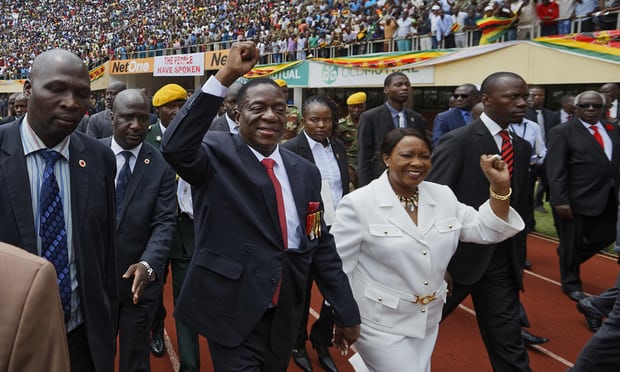- Emmerson Mnangagwa is the New Zimbabwean President
Zimbabwe has sworn in Emmerson Mnangagwa as the new president following Robert Mugabe forced resignation.
Emmerson Mnangagwa became Zimbabwe’s second leader since independence from white minority rule in 1980.
The new president took his oath of office in front of tens of thousands of jubilant Zimbabweans who had gathered at a stadium in Harare, after greeting the crowd with a raised fist.

Emmerson Mnangagwa and his wife Auxillia arrive at the presidential inauguration ceremony in Harare on Friday.
People sang and danced in the stands and raised banners reading “Dawn of a new era” and “No to retribution”, even as human rights activists began to report worrying details of attacks on close allies of the former first lady, Grace Mugabe, and their families. Mnangagwa himself has warned against “vengeful retribution”.
Tendai Lesayo held a small Zimbabwean flag as she sold drinks from a cool box outside the stadium. She said she would welcome a fresh start, saying: “Life now is impossible.”
Elsewhere in the capital, long lines formed outside banks, a common sight in a country struggling with cash shortages and severe economic problems the new president will have to confront.
“Right now, nothing has really changed for me. I still cannot get my money from the bank,” said Amon Mutora, who had been waiting in line since 6am.
Mnangagwa is a 75-year-old stalwart of the ruling Zanu-PF party, widely known as “the Crocodile” – a liberation war nickname that may have stuck because it suited his reputation for ruthless cunning. He was sacked as vice-president by Robert Mugabe two weeks ago, trigging a political crisis that culminated in Mugabe’s resignation on Tuesday.
He will serve until the end of the presidential term next year. An election date has not yet been set.
Mnangagwa was a key Mugabe confidant for decades until they fell out because of the presidential ambitions of Grace Mugabe.
Critics have questioned his role in the Gukurahundi massacres in Matabeleland in 1983, when an estimated 20,000 people were killed in a crackdown on Mugabe opponents by the North Korean-trained Fifth Brigade. Mnangagwa has denied any part in the atrocities
Despite his long association with the government that has presided over Zimbabwe’s decline, including economic collapse and human rights abuses, Mnangagwa has promised democracy and reached out to other countries for help.
Mugabe was the world’s oldest head of state when he quit on Tuesday amid impeachment proceedings. In the end, he became isolated and showed few of the political skills that kept him in power for 37 years and made him a prominent but polarising figure on the world stage.
Mugabe did not attend Friday’s swearing-in, but ruling party officials have said he will remain in Zimbabwe. Officials have promised he is safe and that his legacy as a war hero will stand after his fight for an independent Zimbabwe.
Zimbabwe’s state-run Herald newspaper reported that Mnangagwa had assured Mugabe and his family of their “maximum security”. The report said the two men agreed Mugabe would not attend on Friday because he “needed time to rest”.
As the inauguration crowds passed by, Sharon Samuriwo sat watching from a ledge. She said she hoped Mnangagwa would learn from the errors of his predecessor, but acknowledged that the path ahead for Zimbabwe was unknown.
Still, “after 37 years, we’ve got someone different”, she said.


 Naira4 weeks ago
Naira4 weeks ago
 Naira4 weeks ago
Naira4 weeks ago
 Travel4 weeks ago
Travel4 weeks ago
 Jobs4 weeks ago
Jobs4 weeks ago
 Naira4 weeks ago
Naira4 weeks ago
 Naira3 weeks ago
Naira3 weeks ago
 Investment4 weeks ago
Investment4 weeks ago
 Travel4 weeks ago
Travel4 weeks ago




























